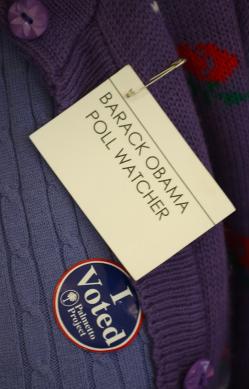The Huffington Post reported earlier today on Project ORCA, a smartphone-based real-time poll-monitoring system developed by the Romney campaign for deployment on Tuesday:
Project ORCA will rely on 34,000 volunteers in swing states on Election Day, in an effort to keep track of who is voting at key polling places. Romney staffers will use the data to help them target their get-out-the-vote efforts before the polls close, in hopes of gaining an edge over Obama’s grassroots operation. “There’s nothing that the Obama data team, there’s nothing that the Obama campaign, there’s nothing that President Obama himself can do to even come close to what we are putting together here,” Romney Deputy Political Director Dan Centinello said Wednesday night in a training call for Project ORCA volunteers, which The Huffington Post called into.Such unfounded “We will bury you”-style bluster is becoming a hallmark of the Romney campaign style. In this case, the two campaigns seem to have developed similar, parallel systems, with one big difference: Republicans appear quicker to have their poll-watchers create work for lawyers. Obama has developed his own smartphone-based real-time poll-monitoring system, code-named Gordon, after the man who reputedly killed magician Henry Houdini. In 2008, Obama’s campaign had built a similar system, named for Houdini, because it was designed to automatically “disappear” voters on the campaign’s list of turnout targets as soon as they showed up at the polls. By late morning, the call volume from volunteers assigned to enter touch-tone reports through interactive voice-response protocols overloaded the campaign’s phone lines and crashed the system. It was perhaps the most staggering tech flop of the year for Obama. While ORCA keeps an IVR option open for volunteers who lack data-equipped phones, Gordon works on smartphones only. “There was no appetite for going down that road again,” an Obama official says. Generally, however, Democratic operatives have grown skeptical that there are many tactical adjustments that can actually be made during election day based on imbalances in turnout. Typically campaigns will patch surrogates into talk-radio stations in areas where they feel they need a boost, and are able to edit phone-center call lists so that canvassers are more likely to be getting out the vote of those who haven’t yet. But it’s often too late for a wholesale redirection of resources to underperforming areas if there’s not already a local field infrastructure in place. “We’re not putting a whole lot of stock in this stuff this cycle—we’re doing bellwether reporting through Gordon but we’re not going to attempt to cover like every single polling location in our target areas,” the Obama official explains. “We figure those bodies are put to better use working the doors.” One crucial way in which the two election-day systems differ is that ORCA allows poll-watchers who spot potential problems to “press a yellow button on their phone to instantly report them to the Romney campaign legal team,” according to Huffpo’s Amanda Terkel. Obama has established a separate system, called LBJ—a salute to the Democratic president who enacted the Voting Rights Act as well as an abbreviation of “Lawyers Bound for Justice”—that so-called voter protection counsels can use to report legal issues. “It’s cool that they built their election-protection stuff right into the app,” one Democratic data manager says of ORCA, “but i don’t know if you’d want to turn every volunteer into an amateur lawyer.”
